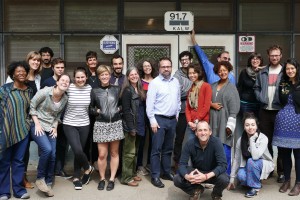Burton High School Drumline Provides Rhythm for KALW and Competes in Winter Guard International – Oh, and Audio Academy Does Cool Stories
By Guest Blogger Ben Trefny, News Director, KALW Public Radio
It’s always a real treat when public radio’s most influential producers come by KALW. We’ve been very fortunate in March to have so many special guests come talk with our Audio Academy, and this week, we had the privilege of sitting down with somebody who has really affected the sound and style of our show Crosscurrents: NPR‘s Planet Money reporter Robert Smith.

Robert Smith, NPR Money Line reporter, joins KALW’s own news room bandline outside the Burton High School studio. Photo credit: John Navas
Robert brings a really personable, relatable storytelling style while adhering to the highest journalistic standards. He takes on some of the most challenging stories to tell – about economic policy and behavior – but through this practiced skills, he makes them the most listenable stories on NPR. He talked with our crew for about an hour-and-a-half, and judging by the 29 people who packed our newsroom, it was an influential experience.
Then there’s what we aired, this week. And the Academy played a big role, as they always do in the spring at KALW.
Academy member Olivia Cueva had a hand in almost everything this week on Crosscurrents. On Monday, she started our half-hour with a truly outstanding story about a hackathon for and by young people of color. On Wednesday, she helped produce a story about a forum on race relations spawned from a racist incident at a Berkeley café involving nationally renowned comedian W. Kamau Bell. And at the end of Thursday’s show, we aired her Audiograph piece about the Burton High School marching band, whose sounds we hear almost every day here at KALW.
And there was more! Academy fellow Liz Pfeffer reported a story, Tuesday, about the scientific study of climate change and whether it relates to California’s drought. Academy member Colin Peden produced Hana Baba‘s enhanced interview with Bay Area News Group investigative reporter Karen de Sa about the overprescription of psychotropic medications to California foster youth. And Academy member Hannah Kingsley-Ma made a story about high schoolers making robots in the San Francisco Unified School District.
Another cool note this week was the amount of stories produced by the Academy that were picked up by PRX Remix, which broadcasts pieces through a 24 hour network airing on stations around the country as well as XM satellite radio. Check these out:
- ‘PRX Remix’ has purchased ‘In San Francisco, coyotes are your wildest neighbors’.
- ‘PRX Remix’ has purchased ‘Teens digitally detox’.
Those two were both made by Academy fellow Kristina Loring. And the next two were made by Academy member Liza Veale:
- ‘PRX Remix’ has purchased ‘Bay Area schools put race on the syllabus’.
- ‘PRX Remix’ has purchased ‘TaskRabbit takes hold in Bay Area divided by income gap’.
And then there was this acquisition of a story reported by Academy member Raja Shah:
- ‘WABE’ has purchased ‘Band of volunteers keeps an eye on SF bond projects’.
WABE is Atlanta’s NPR affiliate – so you know if that station was interested in a story going behind the scenes of San Francisco politics, it must have been really good. And it is! Hear it for yourself!
Here are some thoughts from Raja to close out this week’s ACE Spectrum post:
By Guest Blogger Raja Shah, Audio Academy Member
One day in 2008, I turned on the radio, and what I heard made me jealous. There was a new show on called “Planet Money” — an offshoot of “This American Life” — and it was all about the recent financial crisis. Over the course of an hour, the hosts and reporters managed to take an incredibly complicated subject — one that involved phrases like “collateralized debt obligations” — and explain it in terms that anyone could understand — no PhD in economics required. It was fantastic.
I’d been interested in both economics and teaching since high school, and I had just started tentatively dipping my toe into the world of podcasting. I had no idea what I was doing, but that didn’t stop me from daydreaming about starting a podcast in which I would explain complex economic phenomena in laymen’s terms — I ordered a 700-page macroeconomics textbook and everything. So when I heard that first “Planet Money” episode — despite not knowing a thing about radio journalism — I was naive enough to be jealous of the professionals at NPR for having the same idea as me and executing it flawlessly.
At some point (probably about ten minutes into the first episode), my jealousy turned to awe, and I became an unabashed fan of the show. Now, years later, I’m slowly, painstakingly, learning the art and science of radio journalism myself and getting a chance to try my hand at bringing seemingly boring subjects to life for listeners. For this opportunity alone, the Audio Academy has been a wonderful learning experience, but this week everything came full circle when Robert Smith — one of the hosts of Planet Money — visited the newsroom and walked us through his process when embarking on a new story. He had too much good advice to summarize here, but one piece that stuck in my mind was:
Fantasize about the dream version of your story before you even start working on it, so that you can then figure out how to give yourself the best chance of creating it.
As a Planet Money listener over the last several years, I’ve fantasized about finally getting involved in radio myself, and I’m grateful to the Audio Academy for giving me that chance. I can’t believe there’s only a few months left!
